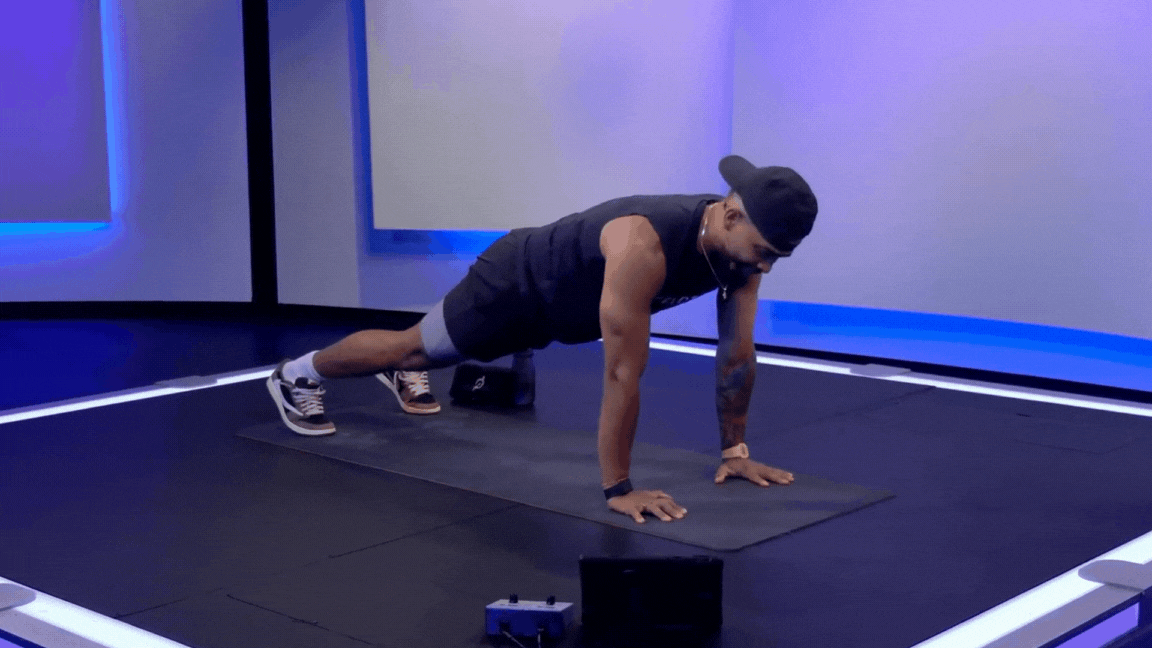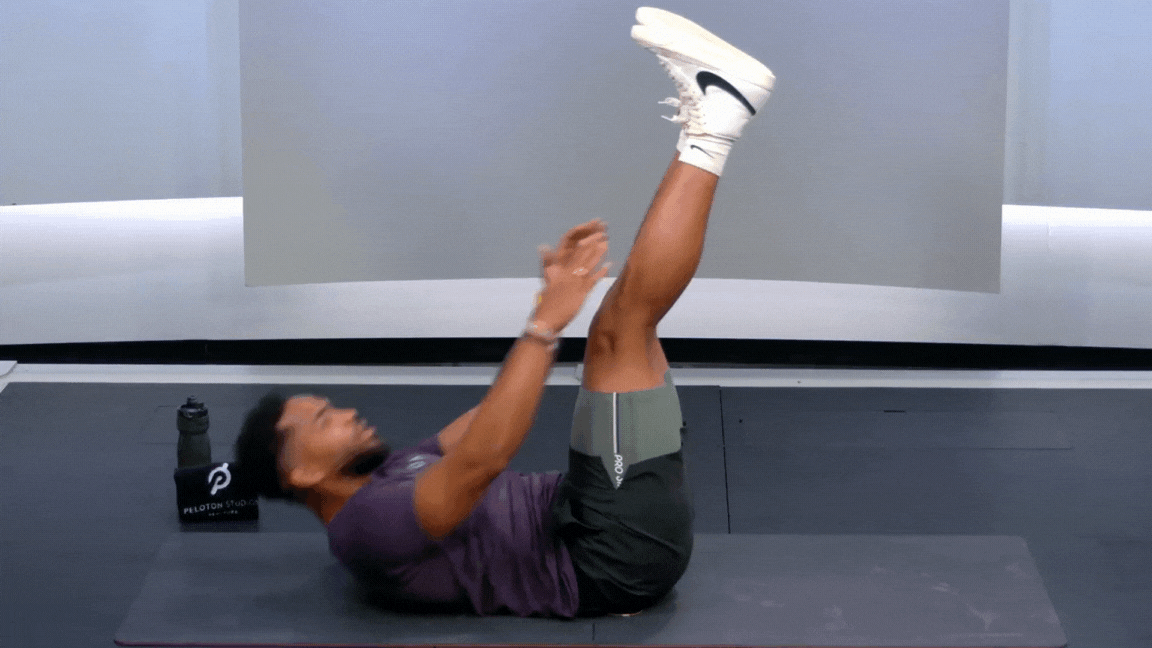What Are Bodyweight Exercises?
How Effective Are Bodyweight Exercises?
Do Bodyweight Exercises Build Muscle?
The Best Bodyweight Exercises for a Full-Body Workout
Peloton strength instructor Rad Lopez explains the benefits of bodyweight exercises and shares the best moves for an effective full-body workout.
If you’re looking for an excuse-proof workout you can rely on at any time, I’d recommend bodyweight exercises. You don’t need any equipment, and you can get in a great workout practically anywhere, for as long or as short as you want—even if it’s just a few minutes.
What Are Bodyweight Exercises?
Bodyweight exercises are exercises that don’t require any weights, such as dumbbells, barbells, etc. Seriously, you don’t need any equipment to do this work. That means you can do these moves pretty much anywhere, any time. Instead of external resistance, bodyweight training uses your own bodyweight as the resistance.
How Effective Are Bodyweight Exercises?
Bodyweight training is actually one of my favorite ways to train because it’s very efficient. As long as your muscles are under tension and are being challenged, these exercises are effective—and they’re super convenient when your equipment is limited.
Some people may think that bodyweight exercises aren’t as good as training with weights, but the truth is that as long as you’re challenging your muscles through repetition and time under tension and fatigue, any bodyweight exercise is an effective way to build strength and muscular endurance.
Another myth about bodyweight training is that it’s just for beginners. Not true! Bodyweight training is definitely a great entry point to strength training for someone with little to no experience. But depending on the moves, bodyweight exercises can work for everyone from beginners to professional athletes. I personally incorporate bodyweight exercises into my training all the time. My favorite exercise of all-time is the push-up—I do about 200 a day.
Do Bodyweight Exercises Build Muscle?
One of the major benefits of bodyweight workouts is that you get your strength in AND you can get your cardio in. Try a high-intensity interval training class (HIIT), and pick up the pace on those mountain climbers! Even running can be considered a bodyweight exercise. So next time you’re in the mood for a workout, consider starting with some bodyweight exercises to get the ball and those endorphins rolling.
Remember: The amount of weight you’re utilizing doesn’t matter. It’s more about the number of repetitions and the amount of fatigue that you’re challenging your body with. Between the resistance of your body weight and the correct amount of intensity, bodyweight exercises are great for building muscle.
Bodyweight exercises have been shown to build muscle “independent of an external load,” according to a study in the journal Physiology and Behavior. In this case, an “external load” refers to dumbbells, weight machines, or resistance bands. So even without the equipment, you can still increase your muscle mass.
But on that note, it’s important to understand that your body will at some point become accustomed to the amount of resistance (weight), therefore limiting any further muscle growth. Progressive overload, or increasing resistance and weight load within the exercise, will be a key component if muscle growth is your goal.
The Best Bodyweight Exercises for a Full-Body Workout

1. Push-ups
Begin in a plank position. Make sure your shoulders are stacked directly over your wrists. Position your arms and feet shoulder-width apart.
Bend your elbows to a 45-degree angle. Pause for a second. Your body should be hovering just above the floor.
Slowly return to the starting position by pushing through your palms.
Muscles worked: Chest, shoulders, triceps, and core
2. Forearm Plank
Start in a plank position. Place your forearms on the floor, parallel to each other. Your spine should be parallel to the floor.
Brace your core as you push through your toes.
Hold this position for at least a few seconds, keeping your body in a straight line. To modify this exercise, place your knees on the ground.
Muscles worked: Core (particularly your transverse abdominis, obliques, and rectus abdominis)

3. Bodyweight Squats
This is an effective way to work your lower body.
Start with your feet positioned a little wider than hip-width distance apart. Rotate your toes out to a 45-degree angle.
Imagine you’re about to sit down in a chair. Slowly bend your knees, sinking your lower body toward the ground. Keep your head and chest up.
Pause when your thighs are parallel to the floor. Push through your heels to return to the starting position.
Muscles worked: Quads, hamstrings, and glutes

4. Jumping Jacks
This is a full-body movement designed to increase your heart rate and work your cardiovascular system.
Begin with your feet together and your hands at your sides. Jump your feet out, raising your arms over your head at the same time. (You can opt to clap your hands together over your head.)
Return to the starting position by jumping your feet back together and swinging your arms back down.
To modify this exercise, step your feet out to the sides instead of jumping.
Muscles worked: Glutes, quads, and shoulders

5. Reverse Lunges
These are good for working your lower body in a unilateral fashion.
Start in a standing position with your feet shoulder-width apart.
Take a large step back with your right leg, leaving your left foot rooted into the ground. Bend each leg, creating a 90-degree angle with your left leg. Your left thigh should be parallel to the ground.
Step your right foot back to the starting position. Keep your head and chest up. Brace your core to protect your spine.
Switch sides and repeat, stepping back with the left leg.
Muscles worked: Glutes, hamstrings, calves, and quads

6. Mountain Climbers
Want to bring your heart rate up? The quicker you perform this exercise, the more taxing it is on your cardiovascular system.
Start in a high plank position.
Drive your knees in toward the center of your chest, alternating legs. Keep your spine parallel to the floor. Engage your core to protect your spine.
Muscles worked: Shoulders and core

7. Burpees
Start in a standing position. Position your feet hip-width apart. Reach down to the ground. Place your hands on the floor and hop your feet back into a plank. (To eliminate the jump, step your feet back instead.)
Lower your chest to the ground—or remain in your plank.
Hop or step your feet outside your hands.
Complete one squat jump—or bodyweight squat—and return to the starting position.
Muscles worked: Quads, hamstrings, and core
8. Bodyweight Renegade Rows
Start in a plank.
Bend your right arm and drive your elbow up toward your ribcage, squeezing your shoulder blades and rhomboids to activate and engage your upper back.
Engage your core to protect your lower back. To modify this exercise, keep your knees on the ground.
Place your right arm back down in the starting position. Repeat on the left side.
Muscles worked: Shoulders, back, and core
9. Glute Bridges
Lie on the ground with your knees bent and your feet flat on the floor. Your heels should be about 6 to 8 inches away from your glutes.
Push your hips up toward the ceiling, creating a straight diagonal line from your feet to your hips. Squeeze your glutes at the top of this exercise.
Slowly lower your hips back down to the ground.
Muscles worked: Glutes, core, hamstrings, and calves
10. Good Mornings
Start in a standing position. Clasp your hands behind your head. Make sure your feet are directly underneath your hips. Keep a slight bend in your knees.
Hinge at your hips, allowing your upper body to tilt forward until your spine is parallel to the floor. Pause for a second.
Slowly lift up and return to the starting position.
Muscles worked: Hamstrings and glutes

11. Toe Touches
Lie on your back. Extend your feet straight up toward the ceiling.
Lift your head, neck, and shoulders off of the ground. Reach your fingertips toward your feet.
Lower your upper body back to the ground. Keep your arms extended.
To progress this movement, extend your legs and arms in opposite directions as you lift up and lower down.
Muscles worked: Core
Level up your inbox.
Subscribe for a weekly dose of fitness, plus the latest promos, launches, and events.
